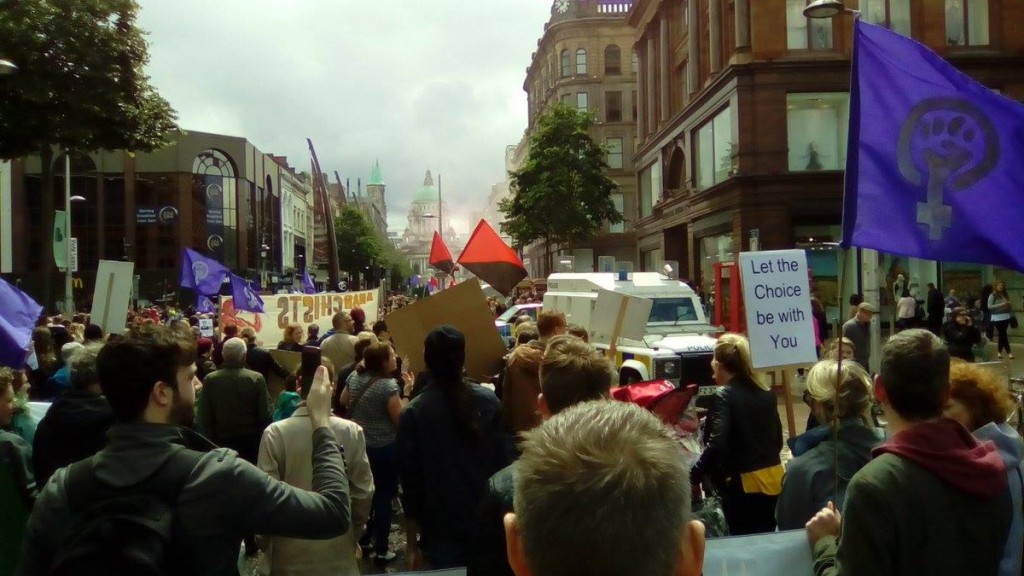2017 must be a year of social movements in Northern Ireland

In many ways, 2016’s tumultuous global politics felt like an extension of Northern Ireland’s status quo; in a region where scandals, crises, and the threat of violence are always present, the year was defined both by our own calamitous governance, rarely reported on outside the country, and by the shock rise of similar populist ineptitude in Britain and the USA.
The year began in the wake of Stormont’s welfare reform crisis, and subsequent ‘Fresh Start’ agreement, following which the Executive agreed both to cut corporation tax in Northern Ireland to 12.5% (as yet not done), and to a budget which saw cuts to NI’s block grant, and to departmental budgets. The atrophying of public services was to be a recurring feature throughout the year.
May’s election saw the DUP retain their 38 Assembly seats, campaigning on the basis of keeping recently-appointed Arlene Foster as First Minister. They then entered government with Sinn Fein, giving Paul Givan- author of the discriminatory “Conscience Clause” bill- the role of Communities minister, responsible for overseeing equality legislation, among other things.
A series of scandals also pervaded the Assembly since May: from the resignation of Sinn Fein MLA Daithí McKay following the “coaching” of loyalist Jamie Bryson in front of a Stormont committee, to Charter NI receiving public funds while being headed by a UDA boss, to the ongoing RHI scandal, which opened up revelations about Arlene Foster’s part in a scheme which wasted upwards of £600,000 of public money. Foster then lost a vote of no confidence, but was kept in office by the DUP’s use of the “Petition of Concern” mechanism.
But despite our political scandals and creeping austerity, 2016 can widely be seen as a year of stagnancy for Northern Ireland- the problems of a lack of accountability for the Executive, the appointment of bigoted government ministers, and the continued use of the ‘Petition of Concern’ mechanism to block Assembly decisions, are all long-term unsolved issues, not helped by an election which saw relatively few seats change hands.
However, social and political movements in NI made some headway in 2016; the campaign for women’s rights was given attention by a series of protests early in the year, sparked by the arrest of a 21-year-old woman (charged with a law dating back to 1861) for taking abortion pills. Following this, the British Pregnancy Advisory Service also came out in support of abortion decriminalisation, as the #trustwomen campaign continued.
This campaign also played a huge role in the election of Clare Bailey to the Assembly, defeating incumbent anti-choice MLA Fearghal McKinney. Clare went on to deliver a 45000-strong Amnesty International petition, calling for abortion law reform, to Stormont.
May also saw the re-election of Green leader Steven Agnew, and the success of Gerry Carroll and Eamonn McCann of People Before Profit in their Assembly bids, significantly boosting the presence of left-wing MLAs in the Assembly.
In the shake-up of government ministers, the DUP exited the Health department- following this, Sinn Fein’s Michelle O’Neill brought the “blood ban” (a ban on blood donations from men who’ve had sex with men) into line with the rest of the UK- while still not ideal, this was a step forward for a major campaign from NI’s LGBTQ sector. This year also saw the opening of Belfast’s Trans Resource Centre, the first of its kind on the island and a crucial space for trans and non-binary support.
Although NI’s political system remains flawed and corrupt, haunted by its past and the failure of its institutions, the year evidently did see some impressive steps forward. 2016 was not a revolution in the North, but the growth of progressive voices has bolstered our social movements. In the coming year, we have to see those movements continue to grow, to hold the government to account, and to press for the rights of the oppressed. Regardless of whether the current RHI scandal triggers an election, the movements that power progressive change will keep fighting.
2017 might also not see the revolution that Northern Ireland needs, but it will undoubtedly see the growth of campaigns that would power that revolution, and fight for the anti-sectarian, egalitarian country that our people deserve.




Leave a Reply